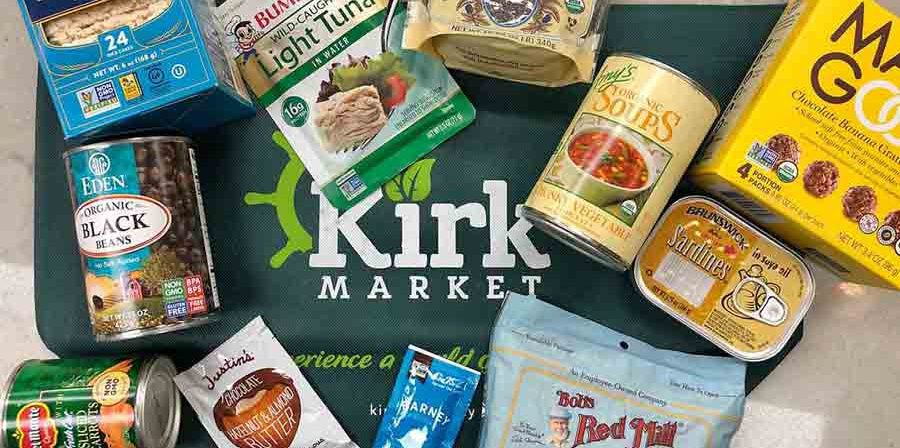In the threat of a hurricane or tropical storm, stocking healthy food items might be the last thing on your mind. Although eating healthy might seem impossible, healthy habits and good nutrition don’t need to be tossed out the window during a natural disaster. Building a nutritious emergency food supply kit is 100% doable. With a little advance prep and a basic plan for food and water, we’ll show you the best healthy hurricane foods to keep on hand to ensure proper nutrition, energy, and long-term wellness.
In an emergency, your top priority is to stay hydrated and get enough calories. You’ll want to prioritize energy-rich and nutrient-dense foods that are high in protein and fiber as these will help you stay fueled and focused, no matter what.
The most critical thing to have on hand is water. It is recommended that you stock one gallon per family member per day, and don’t forget to include your pets (their family members too)! FEMA recommends reserving a three-day supply so a family of four would need to stock at least 12 gallons of water to be adequately prepared. Keep in mind that pregnant women and children will need more.
Focus on foods that provide lasting energy. When relying on a limited food supply, it’s important to choose foods that energize and nourish the body. Foods rich in protein and fiber like beans, carrots, apples, dried figs, turkey, and oats will help keep you full, while foods rich in healthy fats like salmon, tuna, sardines, walnuts and pumpkin seeds will help keep you satisfied after eating them.
While sweet and salty items are often sought out during stressful times, be careful when choosing comfort foods like cookies, candies, and chips as they can deplete you of essential nutrients that help maintain focus, lasting energy, and a healthy immune system. Some smarter choices may include sweet potato chips, tortilla chips made with black beans, coconut, cassava, and organic corn ingredients, flavored whole-grain crackers, and good quality dark chocolate (at least 70% cocoa solids).
Remember to stock safe and healthy foods for family members with special dietary needs. Kirk Market has you covered with items that are low in sodium, gluten-free, soy-free, dairy-free, peanut-free, tree nut-free, vegan and much, much more! It’s also a good idea to be prepared with emergency medication such as an EpiPen in the case of an unexpected allergic reaction.
Finally, keep disposable cutlery, paper plates and cups on hand. Hand sanitizer, rubbing alcohol, and disinfectant wipes are also helpful.
What to keep in your pantry
- Canned tuna, salmon, sardines, chicken, or turkey (although vacuum-sealed packs have a shorter shelf-life, they do come in handy if you don’t have a can opener)
- Canned beans and lentils (can be easily combined with olive oil and vinegar for a quick and energizing salad)
- Canned soups and chili (these can be eaten right out of the can and provide a variety of nutrients; look out for low-sodium options)
- Canned vegetables (remember color is a cue for health and nutrients when it comes to vegetables; go for carrots, beets, asparagus, green beans, green peas, sweet potatoes, yams, and artichokes)
- Whole-grains like oats, bulgur, quinoa, and whole-grain couscous (soaking these grains in water will bring them to life overnight; a simple meal with no heating required)
- Dried fruit like figs, dates, apricots, and cranberries (in the absence of fresh fruit, dried fruits still provide fiber, vitamin C, and potassium)
- Protein powders (a great source of energizing protein that can be mixed in a shaker cup for easy prep, no blender required)
- Nuts, seeds, and trail mixes (high-energy foods that are healthful and convenient for snacking)
- Nut and Seed Butters (a quick protein that is perfectly satisfying; single serve sachets are convenient and less messy; look out for a variety of seed butter options if you have a nut allergy)
- Hemp seeds and Chia seeds (complete vegan protein choices that can be added to boost protein and essential fatty acids)
- Jerky (stick with organic turkey and grass-fed beef varieties)
- Whole-grain cereals (look out for higher fiber and unsweetened options; individually packaged will help prevent these items from becoming stale after opening)
- Whole-grain crackers and crisp breads (good replacement for bread and a perfect substitute when making a sandwich)
- Granola and energy bars (can be very filling, healthy and satisfying; look out for whole food ingredients and bars that provide both protein and fiber)
- Boxed organic milk and dairy-free milk beverages (to keep added sugars under control, choose unsweetened varieties)
What to buy right before
Most of these foods will last at least a week after they’ve been purchased and will give you a fresh alternative to all that packaged food.
- Apples and pears
- Citrus fruits like oranges and grapefruit
- Potatoes and sweet potatoes
- Winter squash like butternut and acorn (these will keep for a few months if not already cut into)
- Eggs (a good tip is to hard boil any remaining eggs in your fridge and keep them in a cooler if a power outage occurs; another quick and complete protein option)
- Tomatoes and cucumber (super hydrating; always start with your fresh produce first)
- Frozen vegetables and fruit or berry varieties (once frozen and fresh supplies are running low; pantry staples will continue to provide nourishment helping your ride out the storm and survive the season safely)

